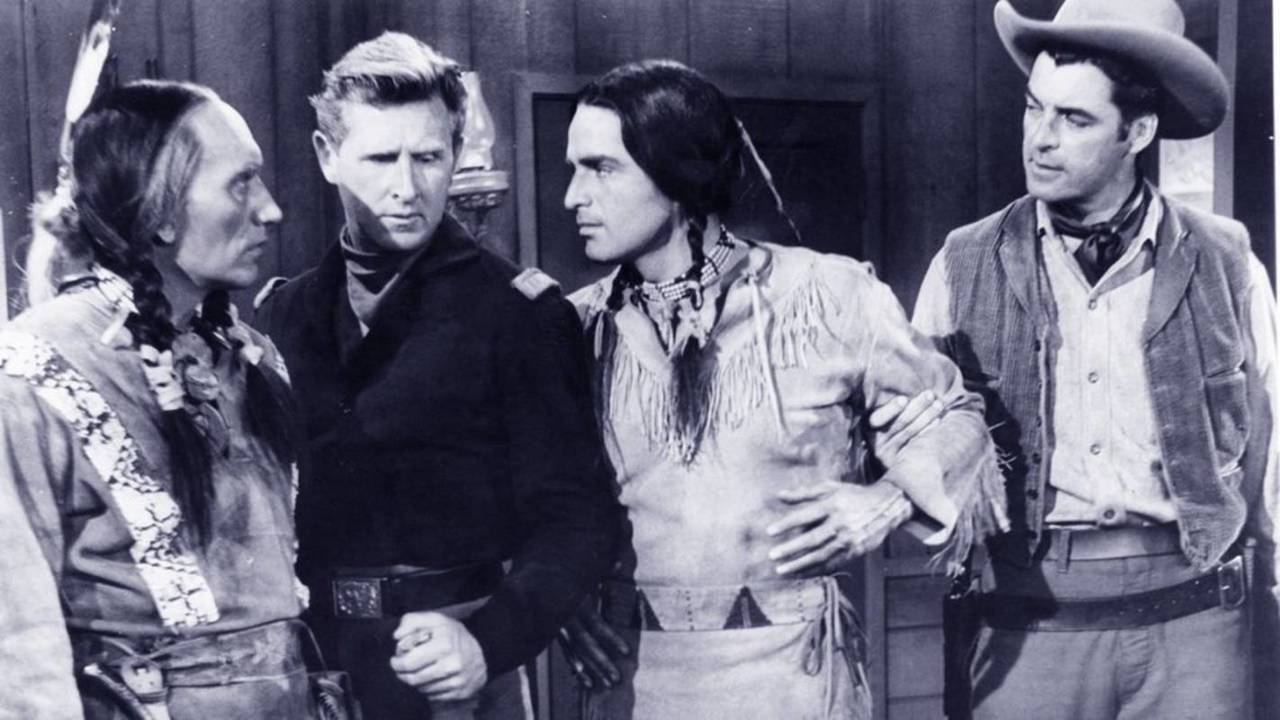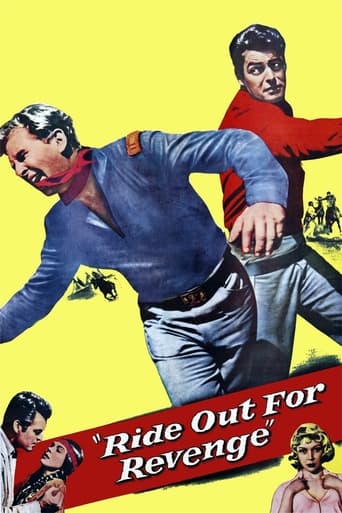Dorathen
Better Late Then Never
ChicDragon
It's a mild crowd pleaser for people who are exhausted by blockbusters.
Mischa Redfern
I didn’t really have many expectations going into the movie (good or bad), but I actually really enjoyed it. I really liked the characters and the banter between them.
Brenda
The plot isn't so bad, but the pace of storytelling is too slow which makes people bored. Certain moments are so obvious and unnecessary for the main plot. I would've fast-forwarded those moments if it was an online streaming. The ending looks like implying a sequel, not sure if this movie will get one
weezeralfalfa
This is essentially the story of 3 men: Captain George(Lloyd Bridges), Chief Little Wolf(Vince Edwards), and Tate(Roy Calhoun). Captain George, a cavalry officer with seemingly only a handful of men to command, charged with keeping the peace in this frontier area, actually foments trouble by ordering the killing of Cheyenne Chief Yellow Wolf when he came to town asking for essential supplies to survive the coming winter. The chief didn't understand that Cpt. George had no authority to issue such supplies, since they were not on a reservation. Yellow Wolf had favored peaceful coexistence with the white settlers, whereas his son, Little Wolf, who succeeded him, talked of stealing the needed supplies from the army depot, and against going to the reservation in Oklahoma, which Cpt. George had received orders to facilitate. An additional reason for wanting the Cheyenne gone was that Yellow Wolf had brought a sample of gold-bearing rock from near the Cheyenne camp to show to Cpt. George, hoping to use it as a bargaining chip. Opposing the goals of both Cpt. George(and the army) and Little Wolf was ex-Indian fighter, Sheriff Tate. He wants peace and the status quo returned. But, the town's people interpret his stance as pro-Cheyenne. Many of them, including Tate. have lost loved ones to Indian murder, hence are not willing to tolerate Tate's position. Also, they know his girlfriend is the sister of Little Wolf, which they believe colors his stance. Thus, a town council recommends that they find a new sheriff. Even the death of his adopted son at the hands of the Cheyenne doesn't dissuade him from the relatively pro Cheyenne stance. At this point, Cpt. George wants both Tate and Little Wolf dead. Tate feels he must kill Little Wolf to prevent an attack on the town. Yet, when he has a chance to shoot him, he cannot. Pretty Willow(Joanne Gilbert)arranges for Tate to meet Little Wolf, out between the town and village. Somehow, Cpt. George receives this information, so plots to kill the two together, if they haven't already killed each other. Tate and Little Wolf knife fight each other, eventually falling into a lake. At this point, Cpt. George arrives, and shoots into the water, apparently killing Tate, while Little Wolf comes to shore. I will stop here, and let you find out the conclusion by seeing the film.Tate, if he lives, has the choice of 2 beautiful women, who are in love with him. One is European: Amy(Gloria Grahame), his landlady, who is very anti-Cheyenne, since they killed her husband and she sees them as greatly inferior culturally. The other is Pretty Willow, whom he favors. I think this union symbolizes a take-home message that interracial marriages should be considered OK, even if they often impose extra burdens and incompatibilities on the couple. However, personally, I think I would have chosen Amy, Tate's age mate, who easily expressed her emotions. In contrast, the much younger Pretty Willow seldom expressed her emotions by her face or words. Even the death of her father, brother, and apparently Tate didn't excite any crying, wailing, etc.. She just clamed up.I found several historical curiosities that relate to this film. The white town was given the fictional name of Sand Creek. Well, the infamous massacre of Cheyenne(mostly women and children) camped at Sand Creek, Colorado, created a stir among bipartisan whites, in it's day. Little Wolf was the name of a northern Cheyenne chief, who famously led a group of Cheyenne from the Oklahoma reservation to Montana, despite harassment by the army(see "Cheyenne Autumn") However, Yellow Wolf was the name of a Comanche, not Cheyenne, chief.See it at You Tube.
Spikeopath
Ride Out for Revenge is directed by Bernard Girard and written by Norman Retchin. It stars Rory Calhoun, Gloria Grahame, Lloyd Bridges, Joanne Gilbert, Frank DeKova and Vince Edwards. Music is by Leith Stevens and cinematography by Floyd Crosby.A black and white Civil Rights Oater, Ride Out for Revenge has good intentions and no little amount of dramatic worth. Not everything works, as it's certainly portrayed in simplistic terms, but the anti-racist core of the story is worthy of viewing investment.We are in the town of Sand Creek and the inhabitants are all bitter victims to the Indian Wars. One man stands alone in Sand Creek, Tate (Calhoun), a one time superlative Indian Fighter who now finds himself in love with a Cheyenne woman and firmly of the liberal mind that war has no favourite side: Misery is equal regardless of race, creed and colour. But can Tate avert an impending massacre that is brewing because of bile strewn hatred? Sand Creek is the base for Capt. George (Bridges), a cowardly drunkard who just wants the Cheyenne out of the Black Hills and down to some army governed reservation. But when cold blooded murder rears its ugly head, and tragedy strikes on both sides of the fence, Sand Creek approaches its day of reckoning.The Wages of Sin, eh Captain?There's no great production value on offer but the film still looks splendid thanks to Crosby's (High Noon) photography. Thematically it's a formula that even by 1957 was hardly original, but the under valued Calhoun oozes enough stoic machismo and emotional conflict to really engage those interested in the Civil Rights side of this period in history. Though the fact that he is lusted after by the twin beauties that are Gloria Grahame and Joanne Gilbert marks him out as one lucky dude!Maybe you's like to know what a savage girl does when her savage father's murdered? She cries. She cries just as hard as you did when John was killed.Is it preachy? No, it isn't. It's a viable narrative doing the best it can on a "B" budget. It should be noted that it very much beats the drum for both sides, it makes sure we know that all parties are scarred by the horrors of this distasteful war. OK! So it wont give the superior Devil's Doorway a run for its money, or even be fit enough to tie the boots of Broken Arrow, but it shouldn't be readily dismissed as weak "B" movie fodder. Besides, it has enough character interest and an extended knife fight by the river to make it at the very least a time waster for the Western faithful. 6.5/10
Scott LeBrun
More sensitive to the feelings of the Indian people than other films of the time, the watchable B Western "Ride Out for Revenge" has some good performances and a decent story to recommend it, even if it's heavy handed in pushing its message home and ultimately forgettable. It does take the viewer out of the movie to see obviously white people playing Indian characters, but then Hollywood still wasn't ready in 1957 to be truly politically correct.The stolid Rory Calhoun plays Tate, a marshal from the small town of Sand Creek who's sympathetic towards the local Cheyenne tribe. Of course, helping him to form that opinion is his love for Pretty Willow (Joanne Gilbert), the daughter of the tribes' chief Yellow Wolf (Frank DeKova). When the chief is cold bloodedly murdered by a gunman, it angers the chiefs' son Little Wolf (Vince Edwards) who leads his people in a raid. Even after suffering a personal loss during the raid, Tate finds that taking care of business is still a tough proposition.Calhoun is fine, Edwards amusing even in light of his miscasting, and Gloria Grahame makes the most of her not terribly important role. But the movie really belongs to a wonderful Lloyd Bridges, who's perfectly slimy as a racist, greedy, cowardly Cavalry officer. It's Bridges who keeps things interesting for the duration; surely a member of the Cavalry had never been portrayed in this negative a light before. Otherwise, nothing about this is anything special - not the direction (by Bernard Girard) nor the script (by producer Norman Retchin, based on a novel by Burt Arthur), although the music (by Leith Stevens) and cinematography (by Floyd Crosby) are nice.Overall, not a bad way to spend 78 minutes.Six out of 10.
dougdoepke
A sheriff battles his gold hungry town and a cavalry captain who covet gold-rich Indian land.The movie's pretty unremarkable except for the cowardly cavalry captain (Bridges). Cavalry officers were generally not portrayed in such a negative light. But here Bridges tries hard, if not very persuasively, to be as craven as possible. The film came along at a time when Hollywood was beginning to recognize the Indians' side of the struggle over land. Thus their side gets a fairer treatment than had been usual. Calhoun plays an Indian sympathizer who tries to control the more bloodthirsty whites in the town. And, of course, he has an eye for the comely Indian maiden (Gilbert), who happens to look a lot whiter than he does. But then Hollywood never cast real Indian women as major romantic interests, even though they might use real Native Americans in all the other parts.I'm not sure why cult actress Grahame is in the film since her part appears inessential. I guess it was for marquee value, though her best years are clearly past. On the whole, it's a rather dull western, without the expected big shootouts, but with a lot of talk instead. Its heart is in the right place, but not much else, I'm sorry to say.

